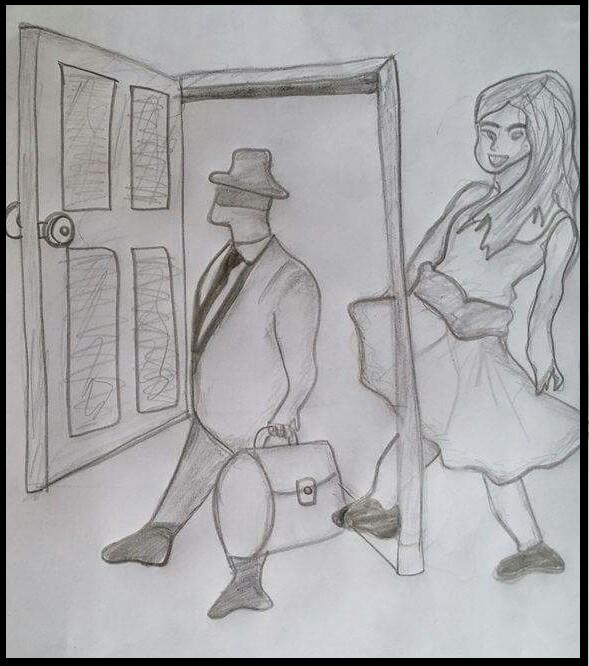Chats are more than normal these days. Learning from daily routines and at work has become part of discussions with peers these days. I remember a colleague talking to me about an experience of encountering a trans-woman at one of the Cardiac Hospitals in Karachi. In her discussion she told me about the difficulties she faced as novice healthcare professional to identify and clear the sexual identity of the client. She further shares that, upon inquiring about her health concerns, the lady responded, “hum wo hain jo apkay han shadi biha k mokay par atay hain” (translation: We are those who usually visit your homes during weddings). My colleague continued her discussion, thinking that the lady is a singer or may be a dancer and attends weddings for entertainment. She continued, “Apkay kam se yaha dakhil honay ka ya ilaj ka koi taluk nahi hai” (Translation: Admitting here or getting treated here has no connection with your work or job). The patient further urged to describe her sexual identity and responded upon the statement: “Me khuwaja sara hu, doctor sahiba” (Translation: I am a Trans-woman, Doctor).
Being a Nurse or Doctor, we are main pillars of healthcare among all kind of professionals to take care of patients at their primary encounter. Are we aware that many of the clients we regularly see have diverse sexuality? Or do we forget to assess or inquire about that? Treating or taking care of these clients even after knowing about their gender identities gives a clear message of treating them with equality and providing them quality care with the same wave length.
But the issue is different. Sometimes we stop treatment after knowing the sexual identities of those individuals. Many a times, we treat them miserably or with neglect after being aware of their sexuality. In addition, many a times we are ignorant in asking about client’s gender, sexual priorities and health issues that might be prime concerns of sexuality. Infections, smell or pus from private parts is secondary. We even never are concerned about asking the marital status, sexual activeness, menopause, andro-pause, family planning or number of children etc. Aren’t all of these are part of sexuality and sexual health of an individual? If the mode of assessment lacks this list, its definite we will skip gender or sexual identity because we feel shameful, disgusted or filthy while talking or discussing sexuality as a conservative community.

(Conceptulized by Sarmad M. Soomar, Drawn by Salman M. Soomar)
In low income healthcare setting where usually the setup of providing care is disturbed to a huge extent because of lack of resources and funding, sexually diverse community face huge disparities. The biggest reason becomes prioritizing clients, fighting own values and fears, judgmental and discriminative thoughts, lack of awareness and understanding about diverse sexualities, lack of acceptance in personal behaviors and sometimes organization policies lack provisions for LGBTQIA people.
Merely making announcements in classrooms about helping people in healthcare without discrimination based on gender wouldn’t be the best solution to develop novice health care providers. Practical mentorship, revised curriculum with understanding of sex, gender and sexual health, physical chance of meet up to apply learned concepts of these clients will be rather more helpful. Igniting a moral insight of accepting and treating LGBTQIA equally with dignity and respect, rather than only emphasizing on the concept of quality and accessible health care to all is more significant to develop extra ordinary health care providers in the near future. Introducing tools of learning in the teaching sessions to talk, communicate, to use appropriate language and use respect and politeness while encountering patients with diverse genders. Mastery of basic concepts, terms and care aspects in health education can be beneficial. Treat them as you treat other clients. Ensure genuineness, show dignity and pay gratitude along with taking care of all the holistic (sexual, physical, social and mental) health aspects with specific needs of gender, culture, ethnicity and sensitivities of their preferences. Don’t underestimate their opinions and choices in decision making of their own health needs.
Sarmad Muhammad Soomar is a nurse by profession and sexual health, child health and mental health advocate by interest. Creativity and innovation in any domain of life are his passion.
Salman Muhammad Soomar is an artist. His notion of creativity reflects from his power of handling the nib of pencil to convert the empty paper into fruitful drawing. Thinking too much and questioning a lot are his habits.
- “The Exclusive Male Extravaganza” – Developing Comfort of Male Advocates Regarding Sexual and Reproductive Health Advocacy - June 22, 2018
- Sex-Platter: Wise Portion, Healthy Sexuality - October 30, 2017
- License to Help – Adapting Behaviors to Cater Diverse Sexual Populations in Healthcare - July 14, 2017

